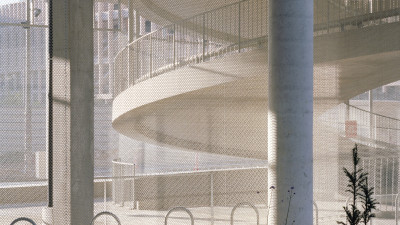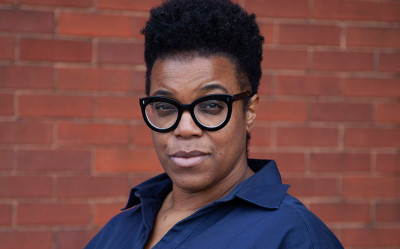“We’re suspicious of new technology because we’re suspicious of capitalism”
By Jack Self
Published 30 August 2018

“We’re suspicious of new technology because we’re suspicious of capitalism”
Is “smart” technology in the home a good thing? What was once about reducing labour and increasing entertainment is radically reframed in the face of 21st-century capitalism, says architect and writer Jack Self.
-
San Francisco, with its proximity to Silicon Valley and its central role in this century’s tech boom, is one of the most technologically advanced cities on Earth. It is commonplace there for homes to be wired up with an integrated network of “smart” devices – everything from ovens, TVs and digital front door locks, to security cameras, speaker systems and air-conditioners.
But as the New York Times reported in June this year, the abundance of tech has made possible a new form of domestic abuse. Ex-partners are hijacking or hacking digital equipment and tormenting inhabitants. The catalogue of intimidation sounds both futuristic and vaguely surreal: thermostats seem to randomly freeze or heat occupants, doorbells ring when no one is there, internet-fridges order mountains of cheese. In some cases, private video from inside a house has been posted to social media. Sadly, very little can be done to protect the victims, because the attacks rarely break any actual laws.
In these cases, it isn’t the technology itself that is the root of the problem, it is the social and legal context surrounding its use. The questions raised are not so much about whether automating a domestic action is technically feasible (it is possible to switch on an oven remotely) but whether it is desirable (just preheat when you get home). In other words, the threats are not the hows, but the whys.
So – a question that Barcelona-based architecture practice MAIO pose in the RA’s Invisible Landscapes installation – what is the advantage of making our houses “smart”? Historically, the argument for inviting more technology into the home has centred around two things: reducing housework and increasing entertainment. Of course, these two processes feed each other. With fewer chores, you have more free time.
-

Robot vacuum cleaner
© Ana Cuba
-
From the early 19th century onwards, labour-saving machines were primarily targeted at women burdened with the drudgery of household management. The gas stove (1828), sewing machine (1830), dishwasher (1850), washing machine (1862) and vacuum cleaner (1901) all made profound differences to the domestic lives of women and their families. By contrast, entertainment technology has traditionally been targeted at men or children. The “man of the house” was not expected to contribute to any work at home. Instead, society encouraged him to rest and relax, to maintain his optimum productivity for the office or factory. Children, of course, make excellent subjects for entertainment because they only consume.
For more than a century, technological innovations in the home fed a feedback loop of leisure and labour. Housework was reduced, entertainment was improved. Many capitalists thought this would go on indefinitely. By the late 1950s, it was largely assumed that the future would feature shiny, Brylcreemed white men overseeing robot-run farms for a couple of hours a week, while their wives played tennis in the gardens of their sprawling bungalow villas. If this went on forever, capitalism would eventually produce a well-paid, highly-trained workforce who spent little time at work, and whose lives would be dominated by hobbies and diversions. This prompted philosophers and writers to ask: what would people do with their lives when they no longer had to work? (My personal favourite in this genre is JG Ballard’s Vermillion Sands.)
-
For more than a century, technological innovations in the home fed a feedback loop of leisure and labour. Housework was reduced, entertainment was improved. Many capitalists thought this would go on indefinitely.
-
The problem with the new-fangled gizmos pioneered in San Francisco is that their benefits are not obvious. Smart fridges that can make automatic shopping orders, or artificial intelligence “personal assistants” such as Alexa, Cortana and Siri, seem less concerned with fundamental liberation and more with incremental convenience. They don’t have any existential purpose. They either streamline tasks that were already marginal, or they solve problems created by the device itself. Increasingly, new categories of home technology require and collect large amounts of personal data to perform their meaningless functions. It turns out Big Brother is a corporation.
The only contemporary vision for the future of the home is the so-called “Internet of Things”, in which every object is able to communicate its status to every other object in a network. Unlike the relentless advance of labour and leisure, the Internet of Things doesn’t have any social agenda – it is not trying to reduce work, or increase entertainment – but sees the creation, collection and management of information in the domestic ecosystem as intrinsically useful. Mysteriously, the data is its own end.
We are suspicious of new technology in the home precisely because we have become suspicious of capitalism itself. In a 2016 YouGov poll, more people in Britain said they preferred socialism to capitalism. It is not clear what this actually means, but it does reinforce the idea that there are now several entire generations that see no public benefit whatsoever to our current economic model. As Piketty showed in his book, Capital in the Twenty-First Century, after 1990 the return on investment exceeded wage growth. This solidified the process of social and wealth inequality that had begun after the neoliberal reforms of the 1980s. It is now the case that if you are rich, you will keep getting richer. If you are poor, there is no hope for an improvement to your life, and no possibility to earn your way out of poverty. Mid-century capitalism said: work less for more money and freedom. Twenty-first century neo-feudalism (which is what capitalism has become) says the opposite: work more for less freedom and money. In this context, technology in the home is radically reframed. Entertainment is about distraction from oppression, and labour-saving is about allowing you to work more on another, economically productive task.
Jack Self is an architect and writer based in London. He is Director of the REAL foundation and Editor-in-Chief of the Real Review. In 2016, Jack curated the British Pavilion at the Venice Architecture Biennale with a proposal titled Home Economics, which explored different facets of the contemporary crisis of living, from how to prevent speculation and exploitation in real estate markets to how sharing can be a form of luxury and not a compromise.




